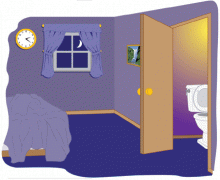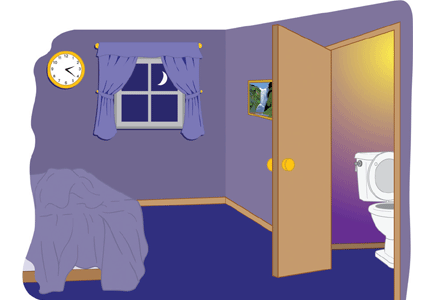User login
If you get up more than once every night to empty your bladder, you should tell your doctor. He or she may be able to do something about it.
Many people get this problem as they get older. It even has a medical name: nocturia (noct = night, uria = urination). However, it is not something you just have to put up with.
What causes nocturia?
A large urine output can be a sign of a number of diseases. Diabetes, for example, is high on the list and not something you should ignore.
Less room in the bladder, overactive bladder, or an enlarged prostate gland can also make you have to go to the bathroom more often. There are drugs that can help with this. Another common cause is urinary tract infection.
Poor sleep. If you keep waking up for other reasons, you may be getting up just because you are awake. Your doctor may be able to suggest treatments to help you sleep better.
Dear Diary…
To help figure out what is causing the problem, your doctor may ask you to keep a “voiding diary” (a urination diary) for a few days to a week. This means you’ll have to measure everything that comes out—every time—and write down the amount and time. Some people use a special plastic measuring container that fits in the toilet.
Some common-sense advice
- Don’t drink a lot before you go to bed, especially alcoholic or caffeinated drinks.
- If you take a diuretic (water pill) for your blood pressure or heart, don’t take it right before you go to bed.
- If your feet and ankles swell, try wearing compression stockings during the day, and sitting with your legs up in the afternoon.
- Get some moderate exercise every day, such as walking.
- Bed is for sleeping. Avoid reading or watching TV when you’re in bed. Keep the bedroom dark and quiet, if possible. And if it’s cold, put another blanket on the bed.
Be safe
To avoid the risk of tripping and falling down on the way to and from the bathroom, make sure that the path is clear before you go to bed. Clean up the clutter. Get rid of throw rugs. Keep a nightlight on so you can see where you are going. Try to discourage your dog or cat from sleeping in the path you’re going to take. Wear slippers that don’t slip.
It may not be possible to make the problem go away completely, but you may be able to improve it. And if you can sleep better, you’ll probably feel better in the daytime too.
This information is provided by your physician and the Cleveland Clinic Journal of Medicine. It is not designed to replace a physician’s medical assessment and judgment.
This page may be reproduced noncommercially to share with patients. Any other reproduction is subject to Cleveland Clinic Journal of Medicine approval. Bulk color reprints are available by calling 216-444-2661.
For patient information on hundreds of health topics, see the Web site, www.clevelandclinic.org/health.
If you get up more than once every night to empty your bladder, you should tell your doctor. He or she may be able to do something about it.
Many people get this problem as they get older. It even has a medical name: nocturia (noct = night, uria = urination). However, it is not something you just have to put up with.
What causes nocturia?
A large urine output can be a sign of a number of diseases. Diabetes, for example, is high on the list and not something you should ignore.
Less room in the bladder, overactive bladder, or an enlarged prostate gland can also make you have to go to the bathroom more often. There are drugs that can help with this. Another common cause is urinary tract infection.
Poor sleep. If you keep waking up for other reasons, you may be getting up just because you are awake. Your doctor may be able to suggest treatments to help you sleep better.
Dear Diary…
To help figure out what is causing the problem, your doctor may ask you to keep a “voiding diary” (a urination diary) for a few days to a week. This means you’ll have to measure everything that comes out—every time—and write down the amount and time. Some people use a special plastic measuring container that fits in the toilet.
Some common-sense advice
- Don’t drink a lot before you go to bed, especially alcoholic or caffeinated drinks.
- If you take a diuretic (water pill) for your blood pressure or heart, don’t take it right before you go to bed.
- If your feet and ankles swell, try wearing compression stockings during the day, and sitting with your legs up in the afternoon.
- Get some moderate exercise every day, such as walking.
- Bed is for sleeping. Avoid reading or watching TV when you’re in bed. Keep the bedroom dark and quiet, if possible. And if it’s cold, put another blanket on the bed.
Be safe
To avoid the risk of tripping and falling down on the way to and from the bathroom, make sure that the path is clear before you go to bed. Clean up the clutter. Get rid of throw rugs. Keep a nightlight on so you can see where you are going. Try to discourage your dog or cat from sleeping in the path you’re going to take. Wear slippers that don’t slip.
It may not be possible to make the problem go away completely, but you may be able to improve it. And if you can sleep better, you’ll probably feel better in the daytime too.
This information is provided by your physician and the Cleveland Clinic Journal of Medicine. It is not designed to replace a physician’s medical assessment and judgment.
This page may be reproduced noncommercially to share with patients. Any other reproduction is subject to Cleveland Clinic Journal of Medicine approval. Bulk color reprints are available by calling 216-444-2661.
For patient information on hundreds of health topics, see the Web site, www.clevelandclinic.org/health.
If you get up more than once every night to empty your bladder, you should tell your doctor. He or she may be able to do something about it.
Many people get this problem as they get older. It even has a medical name: nocturia (noct = night, uria = urination). However, it is not something you just have to put up with.
What causes nocturia?
A large urine output can be a sign of a number of diseases. Diabetes, for example, is high on the list and not something you should ignore.
Less room in the bladder, overactive bladder, or an enlarged prostate gland can also make you have to go to the bathroom more often. There are drugs that can help with this. Another common cause is urinary tract infection.
Poor sleep. If you keep waking up for other reasons, you may be getting up just because you are awake. Your doctor may be able to suggest treatments to help you sleep better.
Dear Diary…
To help figure out what is causing the problem, your doctor may ask you to keep a “voiding diary” (a urination diary) for a few days to a week. This means you’ll have to measure everything that comes out—every time—and write down the amount and time. Some people use a special plastic measuring container that fits in the toilet.
Some common-sense advice
- Don’t drink a lot before you go to bed, especially alcoholic or caffeinated drinks.
- If you take a diuretic (water pill) for your blood pressure or heart, don’t take it right before you go to bed.
- If your feet and ankles swell, try wearing compression stockings during the day, and sitting with your legs up in the afternoon.
- Get some moderate exercise every day, such as walking.
- Bed is for sleeping. Avoid reading or watching TV when you’re in bed. Keep the bedroom dark and quiet, if possible. And if it’s cold, put another blanket on the bed.
Be safe
To avoid the risk of tripping and falling down on the way to and from the bathroom, make sure that the path is clear before you go to bed. Clean up the clutter. Get rid of throw rugs. Keep a nightlight on so you can see where you are going. Try to discourage your dog or cat from sleeping in the path you’re going to take. Wear slippers that don’t slip.
It may not be possible to make the problem go away completely, but you may be able to improve it. And if you can sleep better, you’ll probably feel better in the daytime too.
This information is provided by your physician and the Cleveland Clinic Journal of Medicine. It is not designed to replace a physician’s medical assessment and judgment.
This page may be reproduced noncommercially to share with patients. Any other reproduction is subject to Cleveland Clinic Journal of Medicine approval. Bulk color reprints are available by calling 216-444-2661.
For patient information on hundreds of health topics, see the Web site, www.clevelandclinic.org/health.

